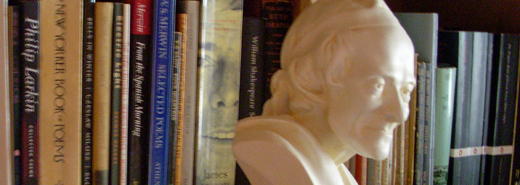Big Ideas:
Humanities and Higher Ed
Tuesday, March 8th, 2011
In the current issue of The New York Review of Books, the eminent professor of comparative literature Peter Brooks considers a clutch of books about higher education in America, all of them critical but most of them, in Brooks’s view, off-target or even “pernicious.” Every time I tune into this querelle, I assume the posture of a critic myself, ready to strip the ivy from the walls and the tenure from the profs. Lately, however, I’ve been asking myself why I’m hostile to the modern university, since I got an excellent education at one myself. Now, it’s true that I got an excellent education at Notre Dame more or less in spite of institutional constructs; I did not perform very well “academically,” largely because I was never persuaded that it was important to go to classes and to do well at tests. (I’d have been done for if I hadn’t been keen on writing, which I took very seriously.) But what’s wrong with this picture? Like a co-ed who goes to college to find a husband, I hung around libraries and seminar rooms hoping to develop an intellect. That certainly happened, even if it did take decades to manifest itself. And if my studies were economically useless, I did emerge with a trade skill, one that, at least in those days, was pretty much taught only on an extra-curricular basis at the nation’s colleges (radio broadcasting). I would have been a slow- to late-bloomer no matter what kind of school I’d gone to. I really shouldn’t complain.Â
And yet I do — for the very reason that I did get an education. I did. Most of my classmates, who were more chary about following the rules, did not. They jumped a series of hurdles until they landed on one kind of career track or another, and that was it for “education.” I don’t mean that they stopped reading good books. What I mean is that what they studied in college was how to do well in school. It was laid out very carefully for them, with teachers ready to help them from one step to the next. If they were diligent and obedient, they wound up with a nice degree — which is to say, a burnished resume. Their good grades would get them into a good professional school (business, medicine, law, architecture), where the aptitude for doing well in school would pay even higher rewards. They might even become teachers themselves. But their educations were over.
What we call “education” in this country — the institutions of higher and lower learning — is aimed at young students, and it is designed to produce “outcomes.” Genuine education, in contrast, is an ongoing, never-ending affair. It gets harder (if more satisfying) as you get older — because you have to swallow the bitter pill of recognizing that most of what you were taught when you were young is now deemed to be wrong, misguided, or simply out of fashion. You have to start all over again. And again. Even if you’re a teacher yourself. This does not come naturally, and it’s even harder to get traction in a system that “graduates” its students by dumping them back into a real world full of defiantly
uneducated people.Â
I’m all for professional school. I don’t want to board an airplane that has been designed and fabricated by well-meaning amateurs. I wish that I’d done better at math, and I don’t know whom to be angrier with about my lack of Latin, myself or my schools. I was a consistently sloppy student — it wasn’t until I got to law school that I understood the vital importance of diligence — and I don’t wish that I’d been graded for creativity and imagination. Measurable academic achievement really meant nothing to me, and it still means nothing, possibly because I don’t believe that anything important is ever achieved. (I treat the idea of “achievement” as do the French, for whom the word is a term for death — game over.) If you build a great building, whether by designing it or obtaining the funding, you had better have a plan for maintaining it, because it is going to need to be rebuilt in twenty-five to fifty years or else demolished (“achieved”). I’m glad that the skills of engineers and architects are rigorously tested. But there is no skill set that will teach you what might be expected of a great public building. That is what the humanist curriculum is for. Â
This isn’t the place for me to lay out my ideas for teaching the humanities seriously. I merely wish to register my conviction that current higher education in the humanities is wasteful and ineffective: the liberal arts are not being taught, and at great expense, too. There may be fine professors out there, like Peter Brooks, who really do illumine the minds of their students, but Brooks himself highlights the problematic nature of his own work, vis-à -vis “successful outcomes” and such, when he observes that it “might best be evaluated, I have often thought, by what students are thinking about and dreaming twenty years after graduation.” If there is a way to subject that kind of teaching to cost-benefit analysis, then it still lies far beyond the grasp of our most brilliant AI research. The one book that Brooks admires, Martha Nussbaum’s Not For Profit: Why Democracy Needs the Humanities, argues against the “marginalization” of liberal-arts studies “by technocratic and business-oriented demands.” But how can a major research university, with its staggeringly expensive laboratories and its equally costly (but loss-leading) athletic programs, shelter the humanities without proposing exceptionalist arguments that it will never argue persuasively?Â
Contrary to received understanding, the university as we know it was never intended to be the liberal-arts finishing school for the well-to-do that the Ivy League colleges became in the later Nineteenth Century. They still aren’t, and neither are the great public institutions. There is no free lunch in this country, and the loftiest benefactions contemplate measurable results. If we all agree that citizenship in a democracy effectively requires some exposure to humanist values and habits of mind, lets stop counting on schools to provide the service as a sideline. Let’s re-think.

















